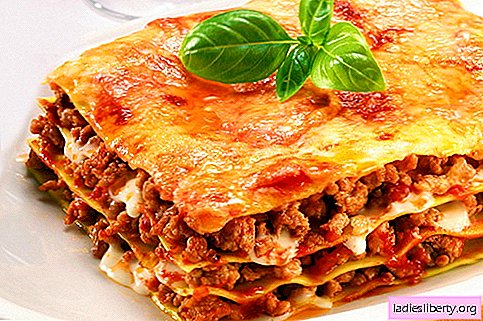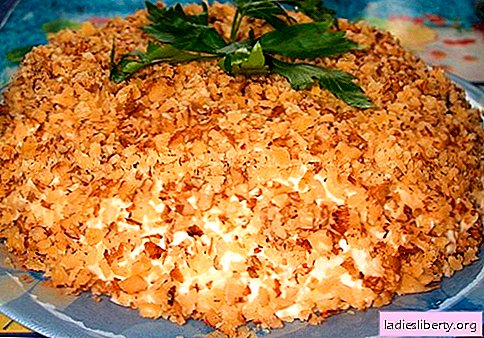
Man is what he eats, and it’s hard to argue with that.
After all, food is the only source of building material for our body.
In this article, on a bowl of control scales, what will the meat outweigh: the beneficial properties of the meat or the harmful ones?
What is useful meat: to whom and in what portions
There are many people inclined to "meat-eating". And this is confirmed by significant positive aspects of consumption of meat products in food.
Who benefits from meat, and in what doses should it be consumed?
The Association of Oncologists recommends to reduce the consumption of meat to a safe dose, which amounts to no more than 70-80 g of meat per day.
It is worth noting that meat consumption also depends on human activities.
Who should increase the dose of meat consumption to 100-150 g per day?
• People experiencing severe physical exertion
• Children and the elderly
• Young people during puberty
• Athletes
• pregnant
For people with hard physical labor, meat, due to its protein content, will help restore lost strength. Athletes are confident that gaining muscle mass without meat products is almost impossible.
Doctors give instructions to pregnant girls to include meat in their diet. Deficiency of B vitamins, which meat is so rich in, can lead to impaired vision and hearing of the unborn baby.
A growing body needs meat to fully develop the brain, maintain muscle mass and stabilize hemoglobin levels.
Meat is recommended for older people due to the fact that with age the memory function weakens due to a deficiency of vitamin B12. Such a vitamin is just present in animal products. Meat also contains collagen, which is designed to slow down the aging process. Dietitians recommend eating dietary chicken meat, as in old age the body is weakened and you should not overload it with heavy food.
Useful properties of meat: is it possible to do without it
To bring meat into your daily diet or not? - everyone has their own answer to this question. In general, you can live without meat, replacing the intake of animal protein with other products, but is it worth it?
Meat is a powerful charge of protein. And protein is the basis of all functioning systems in the body. The meat of young animals is especially useful, since collagen fibers that are difficult to digest are found to a small extent in its content.
The meat contains a huge amount of vitamins, amino acids and trace elements, including selenium and zinc. Zinc deficiency threatens with impaired sexual function, worsening overall well-being and slow healing of wounds. And selenium is responsible for the normal passage of processes in the antioxidant systems of the body.
The next beneficial property of meat is the prevention of anemia! Being a source of iron, meat increases the level of hemoglobin in the blood.
The meat leads to active brain activity, prevents the fragility of joints and provides the right amount of vitamin D.
The main and perhaps most significant disadvantage of meat is its heat treatment, during which carcinogens, the substances that cause cancer, are formed. And it is proved that people who consume a lot of red meat are more likely to suffer from cancer of the gastrointestinal tract: large intestine, stomach.
Therefore, it is necessary to carefully approach the choice of meat. Buy fresh, high-quality and environmentally friendly meat. Try to take meat from private merchants who have their own farms with their cattle.
Which meat is healthier: beef, chicken, pork, fish
Each type of meat has its advantages and disadvantages. We have to figure out which meat is healthier and why?
Unlike other types of meat, chicken is the most harmless and easy for the stomach. Limiting yourself to eating chicken is optional.
Chicken meat - one of the main sources of protein. Chicken meat contains 22% protein, beef - 18.4%, even less protein in pork - 13.8%. In it, to a greater extent than in other types of meat, there are more unsaturated acids, due to which it is perfectly absorbed and serves as a prevention of many heart diseases.
Chicken meat is an excellent dietary meat that normalizes lipid metabolism, blood pressure and sugar levels.
The fat content of chicken is several percent higher than the fat content of lean pork. In chemical composition, they are almost identical.
Chickens purchased at the store often contain antibiotics, which are added to the feed to increase their weight. Therefore, the meat should be carefully processed and boiled meat, changing the water.
The benefits of pork It consists in the vitamins contained in it (B12, D) and trace elements (phosphorus, sulfur, calcium, iodine).
Pork is a leader in the content of vitamin B1 necessary for the normal functioning of the nervous system. The benefit of pork is also its assimilation. Pork is easily digested and digested by the stomach, which positively affects the digestive system.
The presence of selenium in pork restores damaged cells, promotes the renewal and growth of normal cells, protects against heart disease and supports good vision.
Pork also helps to reduce the concentration of cholesterol in the body and favorably affects the functioning of the heart and blood vessels.
Beef differs in the high content of vitamins and minerals:
• A
• B6, B12
• Iron
• Copper
• Cobalt
• Magnesium
• Sodium
• Potassium
• Zinc
• Phosphorus
Beef has the highest iron content. What is iron? Iron is an element necessary for the synthesis of hemoglobin, which ensures the delivery of oxygen to the cells of the body. The advantage of beef - iron is in it in an accessible form and is perfectly absorbed.
Beef is a champion in zinc, which is necessary for the normal functioning of the prostate gland in men.
Boiled beef helps the body recover from colds and infections.
Beef is low in fat and is considered lean meat. This quality makes it indispensable for dieters and diabetics.
By the minimum cholesterol content, white chicken meat is second only fish, which is often referred to as a product that can replace meat. Fish protein is an excellent building material for fabrics. The fish is not inferior in the amount of useful trace elements and vitamins.
The question "what kind of meat is healthier?" does not have a clear answer. The best solution would be to combine different types of meat with fish. But do not overload the body and do fasting days several times a week, eating exclusively light foods, fruits and vegetables.
Each type of meat has its own advantages, so choose the meat that is useful to you.
Meat for children: good or bad
The presence of meat in the diet of children, according to most doctors, is mandatory. The functioning and development of the body is impossible without protein, amino acids and collagen - substances that are so rich in meat. A number of amino acids contained in meat are necessary for the proper development and growth of children. If the decision is made not to eat meat, it is necessary to find alternative ways of entering animal protein into the body. Otherwise, a disorder of the nervous system, anemia and fragility of muscle tissue are provided.
Pediatricians recommend starting the introduction of meat supplements in the form of the least allergenic veal or beef, but be sure to reach the age of 1 year. This is due to the fact that the period of active formation of the body falls on the interval from 1 to 2 years.
Please note that the meat you need to choose the most dietary and lean. It is best served boiled. Note that the daily requirement for meat of children under three years is 65 g.
Why vegetarians do not eat meat
There are different opinions about vegetarianism. But now more than 10% of the world population consciously switched to a plant lifestyle. And this figure has a tendency to constant growth. Why do people refuse meat? There are various reasons for this.
1) moral reasons. Vegetarians protect animals and urge them not to cause suffering. Caring for the animal kingdom, the idea that you eat a poor animal that succumbed to torture and death, can not remain indifferent.
2) Economic - vegetarians are convinced that plant foods will save a lot of money. The price of meat, in their opinion, is overstated, and it does not represent a benefit to eat it. But often maintaining a vegetarian diet (buying special vegetarian products) entails a large amount of cost.
3) Religious beliefs (Hinduism, Buddhism).
4) Ecological - vegetarians say that raising animals negatively affects the environment.
5) Medical reasons - plant food allows you to protect yourself from a number of diseases. Researchers have proven that among vegetarians, coronary heart disease and myocardial infarction are 5-10 times less common.
American scientists have proved that the transition to a healthy lifestyle, namely to a low-calorie vegetarian diet, completely regress atherosclerotic plaques in the vessels without the use of additional drugs. Vegetarians have hemoglobin 20% higher than those who are not a supporter of plant-based nutrition. Athletic vegetarians can fight cancer cells: a simple change in diet makes blood so hostile to cancer.
Plant food contains all the substances necessary for the human body: proteins, minerals, amino acids and vitamins.
A person on a vegetarian diet is recovering faster. And they turn to doctors, as a rule, with a preventive purpose, and not with diseases. Vegetarianism is an easy, enjoyable and healthy lifestyle to be happy.
Man is an integral system. And yet: to be or not to be meat at the dinner table? The answer will be: eat quality and properly cooked meat in a metered form.
Listen to your body, choose the type of meat that will be most beneficial to your health, and be healthy!











